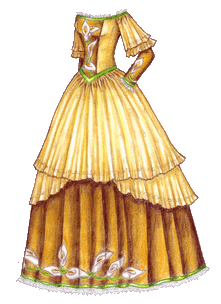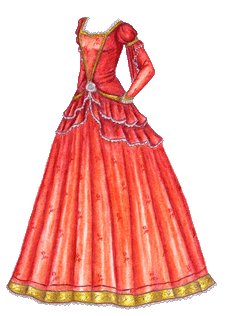 Click for larger version; click for the list of dolls.
Click for larger version; click for the list of dolls.
“Those are mine, Father,” the youngest daughter Joy said quickly. “I sent them to the cobbler yesterday because they were so worn. Is something wrong?”
The king’s face softened, and he started to smile. It was quite impossible to be angry at Joy, who had arrived an orphaned baby at the castle in such a miserable little basket during the worst ice storm anyone could remember. “I am just curious as to why your new slippers are so worn. Surely you are not leaving the castle?” Joy turned quickly to Perdita, the eldest, who had come over to them.
“No indeed, how could we leave? There is nothing for miles, and the attendants know that we aren’t allowed the horses and carriages without your permission. Besides, the weather is so very treacherous this month that I for one wouldn’t want to leave, don’t you think Camellia?”
Camellia was one year younger than Perdita and was well known for her wisdom. “Of course! Dear father, the shoes are only worn because we have been so busy preparing for Christmas. We’ve run all over the castle all this week. Juliette even decorated the South Tower yesterday, and you know how many stairs that one has.” When quizzed, each princess could provide a plausible reason for her shoes being worn out — decorating, games of hide-and-seek, aimless walking. However, although they spoke earnestly and without any nervousness, the King felt that all was not right. The explanations were so weak, for one thing, and they moved languidly, as if they were tired. A couple of them seemed to have dark circles under their eyes, Natalie was rubbing her feet when she thought no one was watching, and Daphne was still sleeping. He left the room perplexed, not willing to admit that his honest and good daughters had lied to him, but feeling like something was going on beyond his knowledge.
First he summoned the Minister of Defense and found that the castle guards had neither seen nor heard anyone leaving the Princesses’ quarters or the castle. Next came the Minister of Architecture, who after being briefed by the Chancellor dispatched his subordinates to go over every inch of the Princesses’ quarters and check for secret passages or hidden doors. None were found, and the King resorted to calling the Minister of Sorcery, a mysterious man who the King didn’t really like to bother.
“I quite understand the situation,” the Minister of Sorcery said imperiously after the King had explained all. “Unexplained movement, no possible means of escape, the girls’ excuses have the ring of truth and yet their behavior seems odd… Of course, it can only be an enchantment. Did they seem enchanted to you?”
“Not at all,” said the king uncertainly.
“Well, never mind that, that’s part of the enchantment. Yes, there was a similar case I read about, very curious indeed, where the victims accessed a sort of portal and, led on by demons through halls of crystal and gold, they danced all night with enchanted princes.”
The King’s face had been turning paler with each detail. “Demons? Dancing? Not my poor girls!”
“Your only hope,” continued the Minster, “is to ascertain the details of the enchantment and confront them with the truth. But it must be done secretly, such that the princesses are unaware that something is amiss.”
“You mean to spy on them?”
“Well, yes, you could say as such. I believe I know just the person we need, as well. I have long remarked that the cobbler’s assistant would be better suited to stealthier work, and indeed have even thought of making him my…”
“The cobbler’s assistant?” interrupted the king. “Should it not be a prince of some persuasion?”
The king’s chancellor coughed. “Most of those of noble birth who have visited the castle as of late left almost in tears after being bested in chess. I doubt they would wish to revisit the scene to do us a favor.”
“Princes be hanged, then,” the King replied irritably. “Find this assistant and set him on the case.”
This dress belongs to Camellia, who is twenty-four. Where Perdita is clever she is wise, and when there are differences among the princesses she’s often called on to resolve them; her father also goes frequently to her for advice, for she’s quite as learned as any of his advisors and has even written books about their country’s laws and history. She is a little more assertive and direct than Perdita, but she respects the king and thinks him fair, if a little overprotective, although she would secretly love to travel. (It’s my opinion that if the stronger, more independent Holly and Pieris had been born first, none of this would have happened.) She loves champagne colors and calla lilies.
 Share
Share